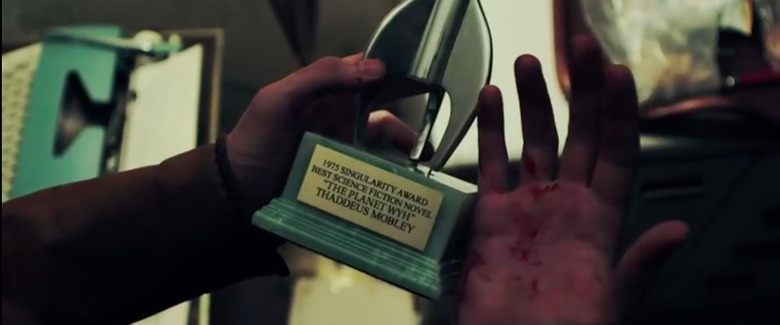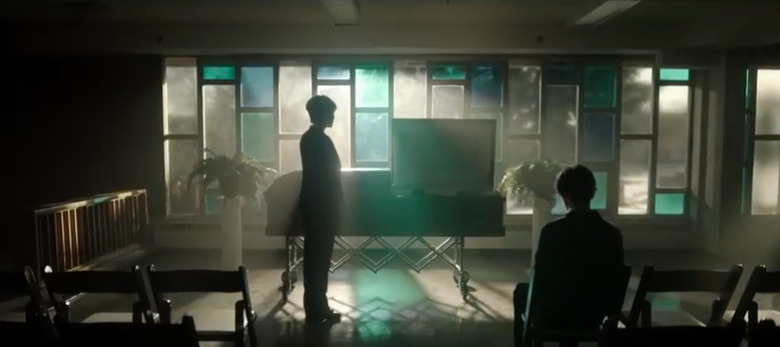'Fargo' Review: Who Made The Biggest Mistake In 'The Law Of Non-Contradiction'?
(Every week, we're going to kick off discussion about Fargo season 3 by answering one simple question: who f*cked up the most this week?)
This week's episode of Fargo is heavy on the melancholy. Ennis Stussy (Scott Hylands) kept quiet and miserable in the first two episodes of season 3...mostly because he's dead. Even when he was a younger man, he suffered like so many other Fargo characters.
To answer the question "Who is Thaddeus Mobley?" Noah Hawley's show pays a trip to where many Coen Brothers' characters have experienced pain: Los Angeles.
Where Writers Are Put Out to Pasture
Thaddeus Mobley (Thomas Mann) is like a classic tragic Coen Brothers' protagonist in director John Cameron's episode. Right from the start, he makes the mistake of trusting a devilish producer, Howard Zimmerman (Fred Melamed). When Zimmerman whispers behind Mobley's ear, he's the devil on his shoulder, pulling him into a dark hole with the help of young Vivian (Francesca Eastwood).
After "The Law of Non-Contradiction," it's easy to understand why Ennis wasn't precisely the talking or smiling type, and why he returned to the cold of Minnesota and lived out his final days alone. Probably not the future young imaginative Mobley imagined for himself when he first stepped foot in Los Angeles, which makes Hylands' performance and the character's death all the sadder.
When Zimmerman says the writer will get over what happened to him, and what he did to himself and others, we know he won't.
The author of "The Planet Wyh" and his heartbreaking journey sometimes calls to mind Barton Fink. The writer gets chewed up and spit out of L.A., like Barton that classic Coen brothers film, whose time in the city also ended in a burst of violence. Their creative pursuits helped land them both in violent messes.
Gloria's description of Mobley's science-fiction story is also familiar to some Coen brothers' movies: a character/robot wandering a cruel and random world searching for meaning. After living 2.38 million years, and after witnessing such wonders in the universe, he's turned off and dies like the rest of us. After the droid's journey is over, what does all his time in the galaxy mean? Nothing? In "The Law of Non-Contradiction," questions lead to more questions, as they do on Fargo.
Zimmerman and Vanessa Eat the Big Cheese
Fred Melamed has an amazing ability to act genial and sinister at the same time. He once again gets to play a character in, let's call it, the Coen-verse, who's equally threatening and hilarious. Rarely do villains sound as pleasant as Melamed does in his delivery. Even after Mobley finally figures it out he's been duped, the actor's tone remains almost fatherly.
When Gloria meets old Zimmerman, he delivers a speech either monumental or superfluous to Fargo. Zimmerman wonders if any of these collisions, like his one with Thaddeus or countless others we've witness on Fargo, actually mean anything in the big picture:
It talks about how we're all just particles...we're floating out there...we're moving through space...nobody knows where we are. And then every once in a while...BANG! We collide. And suddenly for...maybe a minute. We're real. And then...we float off again. As if we don't even exist.
Now, in Zimmerman's last days, he doesn't say whether he still wonders about these ideas. Vivian, on the other hand, maybe does. Those painful moments in time have stayed with her. She's a terrific antagonist: a remorseful and empathetic one. Guilt is central to the FX series and the Coen Brothers' work, but we don't always see remorse like this in their villains.
As for his idea of floating off and ceasing exist, I can't help but think of Mike Milligan (Bokeem Woodbine) from season 2. After everything he went through, he was left alone in an office, where he probably spent his remaining years before being forgotten. Zimmerman's speech applies to a few Fargo characters, if not all of them.
Beauty in A Sea of Cell Phones
Ennis Stussy meant something to somebody, Gloria Burgle (Carrie Coon) said in a previous episode. In "The Law of Non-Contradiction," that somebody is Gloria, who manages to stay kind in L.A and leaves the city unscathed. The way she looks at her former stepdad with such empathy, as he's laying in the casket, is a beautiful moment. She learns to understand in a way she hadn't before.
Fargo is a dialogue-heavy and consistently quote-worthy show, but it also has some profound silences. The warmness of the funeral is so visually affecting. Throughout this episode, Coon says a lot without saying anything out loud, especially during the touching and cathartic funeral where only two people are present, and nobody says a single word about the departed.
The Biggest Screw-Up: Thaddeus
Without question, the biggest screw-up of the episode is Thaddeus trusting Zimmerman. That's where his downfall and this crime story all began. Zimmerman started the domino effect: he sent the writer packing to his place of death. His murder would then result in Ray Stussy (Ewan McGregor) and Nikki Swango (Mary Elizabeth Winstead) dropping an air conditioner on his killer's head. Over 30 years later, the producer's scheme and greed are still causing problems, creating collisions.
If Thadeus ever questioned the evil man's facade and walked away, then maybe he and Maurice LeFay (Scoot McNairy) would still be breathing. And if Zimmerman never ordered Mobley that cream soda, then Ray, Nikki, and Emmit's fates might appear brighter than they do now.



